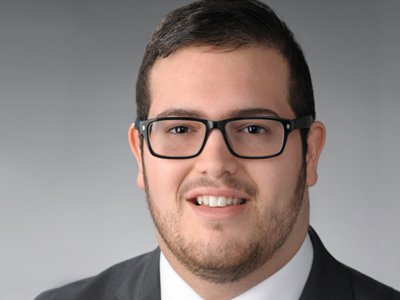Onondaga Lake Research Leads to EPA Fellowship
José L. Marrero-Rosado '17 works with team analyzing chemicals in lake

José L. Marrero-Rosado '17 will spend the summer interning at an Environmental Protection Agency (EPA) lab as part of competitive, national fellowship awarded for his role in researching chemicals in Onondaga Lake. The two-year Greater Research Opportunities (GRO) Undergraduate Fellowship from the EPA comes with a $50,000 grant.
"If you are interested in the environment as a scientist, the EPA is the place to go," says Marrero-Rosado, a dual biochemistry and anthropology major in the College of Arts and Sciences and Maxwell School. "They have the funds and they have really bright scientists. I will get to see how the agency works. It will be a great opportunity."
He has narrowed down his top three internship choices from 60 EPA projects and expects to make a decision by May 23. Most projects involve sampling water bodies and their organisms to analyze such conditions as coral reef acidification, greenhouse gas responses, nitrogen pollution, or lethality indicators, he explains.
His internship interest fits well with his Syracuse University research. Since his first semester, Marrero-Rosado has worked with Katharine Lewis, associate professor of biology, on a project investigating the toxicity of two chemicals present in Onondaga Lake. The lake is a federal superfund site as a result of more than a century of pollution from businesses that dumped industrial waste in the water.
This project was funded through the Hill Collaboration on Environmental Medicine. The research team also involves John Hassett, chemistry professor at SUNY ESF, Jim Hewett, associate professor of biology at Syracuse, and Frank Middleton, associate professor at Upstate Medical University, are also on the research team.
Hassett identified two chemicals, PTE and PXE, in the lake several years ago. Their chemical structures are similar to the known toxic insecticide DDT, suggesting that PTE and PXE might also be toxic. The research team is studying whether the chemicals are toxic to aquatic vertebrates and whether they cause an increase in experimentally induced seizures in either zebrafish or mammals.
Marrero-Rosado, working with another student, Jason Zheng '16, has shown that both of the chemicals are highly toxic to both zebrafish and frog embryos and that exposure to either compound increases the incidence of seizures in zebrafish larvae.
"This fellowship is very well-deserved," Lewis says. "José has spearheaded this project and generated some very interesting and disturbing results which should lead to at least one important publication this summer and, hopefully, to a rethinking of aspects of the Onondaga Lake cleanup.
Marrero-Rosado presented a poster on the research at the 2016 Meeting of the Minds Undergraduate Research Conference, sponsored by the Atlantic Coast Conference. He also presented on the research at the HENAAC 2015 conference in California, and the LSAMP 2016 conference in Maryland.
Despite cleanup of Onondaga Lake, Marrero-Rosado says "it should not be used for recreational purposes yet." The team's research suggests that even low concentrations of these chemicals' could be harmful. "The levels of these chemicals should be investigated before they say the lake is safe for use," he says.
Marrero-Rosado, who is from Puerto Rico, recently was named a 2016-17 Remembrance Scholar. He is also a McNair Scholar and he chairs the Student Life Committee on the University Senate, serves as a student representative on Syracuse's Board of Trustees, and serves on the Division of Student Affairs' Student Advisory Board.
The fellowship "encourages promising students to pursue careers in environmentally-related fields and to continue their education beyond the baccalaureate level," according to the National Center for Environmental Research.
Marrero-Rosado hopes the EPA internship will guide his decision about what field in which he will pursue a PhD. As a joint anthropology major, he's also interested in lead content in bones and studying lead poisoning in urbanized contexts.
"With the EPA, I will be learning to take samples and work in the field," he says.
In the meantime, with a full academic load and a busy extracurricular career, Marrero-Rosado hasn't had time to enjoy the beautiful views and sunsets along Onondaga Lake. "I hope to get out there soon," he says.
